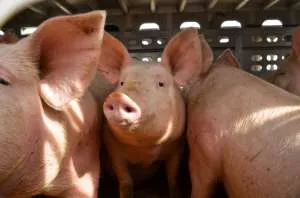Researchers from the University of Iowa found that pig farmers are six times more likely to contract multidrug-resistant Staphylococcus aureus (S. aureus) than an average person who does not come into contact with pigs. This research is the first study of its kind in the U.S. and the largest examination of a group of livestock workers worldwide.
“S. aureus does not typically make pigs sick, but they can act as carriers and transmit the bacterium to farmers,” said co-author Tara Smith, Ph.D., an associate professor at Kent State University, Ohio, whose involvement with the study took place while she was a faculty member at the University of Iowa College of Public Health.
Bacterial infections can range from mild to serious
S. aureus is commonly found in the noses, throats, and on the skin of both people and animals. Approximately 30 percent of the population in the U.S. are carriers of S. aureus. This nasty bacteria can cause an array of soft tissue and skin infections ranging from minor to very serious. Unfortunately, many of them can be very difficult to treat.
“While carriage of S. aureus isn’t itself harmful, individuals who harbor the bacterium in their nose, throat or on their skin are at risk of developing an active staph infection, and they can also pass the bacterium to other family or community members,” explained Smith. “Individuals who may be immunocompromised, or have existing conditions such as diabetes, are especially at risk from staph infections.”
Increasing numbers of antibiotic-resistant bacteria strains of S. aureus, such as methicillin-resistant (MRSA), tetracycline-resistant (TRSA), or multidrug-resistant (MDRSA), are posing more of a threat than ever. This threat brings about a growing need to understand as much as possible about the carriage and infection of S. aureus. Despite previous research showing a link between livestock and some strains of S. aureus, not enough information is known on the carriage and transmission of infection.
Safety of swine farmers at stake
Since pigs are typically not affected by staph infections, it doesn’t pose economic concerns. The threat is to the safety of pig farmers, but it is hoped that the findings of this study will raise awareness about the risks in swine operations.
“Iowa ranks third nationally in overall livestock production and first in swine production,” explained Smith. “Transmission of staph between pigs and farmers and into the broader community could complicate efforts to control S. aureus transmission statewide, and have effects nationally due to the travel of pigs and people carrying these bacteria.”

The study took place over a 17-month period and involved a participation group of 1,342 Iowans that included a comparison group from the community, as well as people who have contact with livestock. To establish a baseline at the beginning of the study, nose and throat swabs were taken from each participant. In this way, they could determine who was already carrying S. aureus. Any participants who were found to have skin infections during the study were also evaluated for the presence of S. aureus.
The findings showed a full 26 percent of the study participants were carriers of the bacteria. However, compared to the community group, livestock farmers had a significantly higher exposure rate. They were especially at risk for the strains of MDRSA and TRSA.
Swine farmers at high risk
“Current swine workers were six times more likely to carry multi-drug resistant S. aureus than those study participants without current swine exposure,” explained Smith.
“Swine workers are also at risk of becoming infected with these organisms,” Smith explained further. “One hundred and three potential S. aureus infections were reported, and included infections with livestock-associated strains of this bacterium.”
—The Alternative Daily
Sources:
http://www.futurity.org/farmers-pigs-staph-infections-911872
http://cid.oxfordjournals.org/content/early/2015/04/12/cid.civ234.abstract
http://www.cattlenetwork.com/news/industry/study-shows-higher-prevalence-drug-resistant-staph-aureus-among-swine-farmers
